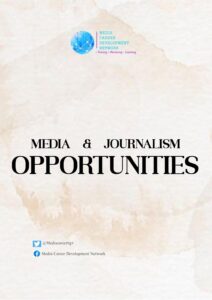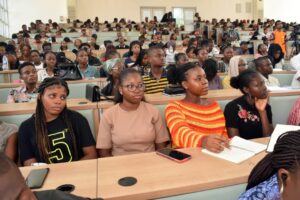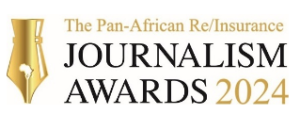Patrick Egwu, Nigerian award-winning freelance journalist currently a fellow on the Investigative Reporting programme of the Open Society Foundations at the University of the Witwatersrand speaks on the various opportunities journalists should take advantage of despite the impact of the pandemic on the media industry
The COVID-19 pandemic occurred while you are on a fellowship in South Africa where you are now, how did it affect your programme and how have you adjusted to the situation?
It was a difficult situation arriving at a new environment and facing global pandemic as we know it to be now. I only attended lectures for about a month at the University of Witwatersrand where the fellowship is taking place before the pandemic started escalating pretty fast and soon after, a 21-day lockdown was announced as part of nationwide measures to contain the virus. More lockdown restrictions were made subsequently, and everything was really disrupted by the pandemic. But I must say that beyond attending physical lectures and practical sessions on campus, the pandemic has not really affected my programme. After campuses were closed and lockdown measures announced, we immediately switched to online learning mode – Zoom, Skype, Google Meet, emails, and WhatsApp groups have been serving this purpose.
We have had data and investigative journalism boot camps, workshops and completed some projects with great journalists teaching us as part of the fellowship using these platforms. For instance, we had Mark Lee Hunter, a great investigative journalist and teacher who would have arrived in Johannesburg for a two-week-long session via Zoom and it was a wonderful experience. We also had a workshop with the team from Bellingcat on forensic and open-source journalism – all on Zoom. The fellowship has been progressing smoothly without any disruptions despite the pandemic. Now, the second part is underway, and we are getting ready for other investigative journalism workshops, sessions, and our reporting projects.
What impact will you say the pandemic has had on the media and the career of journalists generally?
Media industries around the world have been severely affected by this pandemic. We have seen newsrooms and media organisations announcing pay cuts and layoffs. Some media outlets around the world have closed publications while some have reduced the number of print copies produced. Some newsrooms cannot even pay salaries while others are seeking bailout funds and other relief packages from the government and other organisations to survive. I know many of my colleagues who have been affected by this especially pay cuts and layoffs. It is even direr for freelance journalists who do not work full-time with any media organisation and rely on regular commissions or working as fixers to pull through. But media outlets have reduced the number of commissions for freelance journalists around the world and payments for stories completed and published are taking time to be paid.
We have also seen the cancellation of many international and local media conferences and events around the world. I was readying to attend and speak as a panellist at the International Journalism Festival [IJF] in Perugia, Italy in March when it was postponed to 2021 after the pandemic got worse in the country. Last month, I was meant to be in the United States to attend the Investigative Reporters and Editors [IRE] conference in Washington DC. But the conference has been moved to take place virtually in September after the United States became the global epicentre of the pandemic. The annual African Investigative Journalism Conference [AIJC] which is organised by my departments at Wits University would be taking place virtually too. There are also many other media engagements, hangouts, trips, and collaborations that would have taken place but have all been either cancelled, postponed, or now taking place virtually because of the pandemic. This is the present reality and it’s going to take a while for us to recover from these disruptions.
READ ALSO: HOW I BECAME AN INTERNATIONAL FREELANCE JOURNALIST
What are your suggestions for media organizations in Nigeria and individual journalists on how to survive the crisis situation?
I feel there is a need to develop different financial sustainability models that will help media organisations to survive and cope during situations like the pandemic. I’m sure as of November and December 2019, many media managers and news organisations never knew what the new year [2020] would be for the media industry and didn’t plan for its impact. Perhaps they had other plans for the new year until the pandemic came and changed our world. Having different viable funding models would help avoid situations like pay cuts, layoffs, or the closure of media organisations in cases like these. But I always believe that many opportunities abound during times of pandemonium and global crisis like this. In Nigeria for example, some media organisations are still commissioning journalists for COVID-19 related reporting.
The Wole Soyinka Centre for Investigative Journalism [WSCIJ] has been providing funds to journalists to do some reporting on coronavirus and I know many journalists who are doing amazing reporting through this opportunity. The International Centre for Investigative Reporting [ICIR] in collaboration with the International Budget Partnership (IBP) has been providing funds to journalists in the country to do reporting on the impact of the pandemic on smallholder farmers in the country. the Public and Private Development Centre [PPDC] and Dataphyte have announced they are providing support to investigative journalists to carry out field investigations. BudgIT recently announced new fellows for some reporting in the country and many of them are my colleagues. There are others but journalists need to get up and take advantage of these opportunities instead of waiting for them to come to you.
With your stay in South Africa, how will you compare the media in the country with that in Nigeria?
Just like Nigeria, South Africa has a vibrant media industry and arguably, the best on the continent. Some of the media organisations and outlets here are doing big media projects and contributing to the global conversation of holding power to account. South Africa is one of the media hubs on the continent alongside Kenya and Senegal with some of the big global publications having their bureaus here. The AIJC – the biggest investigative journalism conference in Africa which brings together some of the finest investigative journalists on the continent takes place at Wits University each year. There are insurance coverage and adequate welfare packages with laws that don’t allow employees or media organisations to owe journalists their paycheck. This, as we know, is different from the situation in Nigeria where some media organisations and employees owe journalists for months and years.
I’m still trying to figure out how you expect a journalist to perform under such environment that neither motivates nor supports. An editor or newsroom would want a journalist to use his own funds and produce a “Pulitzer” kind of ground-breaking investigative story when there are no motivation and little editorial support to aid their work. This must change, really. Of course, I know there are some media organisations in the country that are exceptions with adequate motivation and welfare packages for journalists. But a situation where there is no security, insurance cover or the adequate financial motivation for journalists who risk everything to cover daring stories won’t help the industry grow. We must do better to revert this trend.
What are opportunities available for journalists to take advantage of it this time?
I can tell you that even though we are facing this global crisis with challenges that come with it, there are many opportunities out there for journalists. The problem, however, is that either some journalists don’t know about these opportunities or are unwilling to know and explore them. For freelance journalists, some foreign newsrooms need stories about pandemic from different countries and regions at the moment. Even though there have been cuts in the number of commissions, there is also the growing information need about the pandemic and how it is affecting local communities around the world.
As a journalist based in Nigeria for instance, you can explore and grab this gig of writing for some foreign outlets about how the pandemic is affecting local communities around you. A Nigerian female journalist recently got a collaboration gig with some German journalists who won a grant to do a story in Nigeria and since they couldn’t travel, they needed to get someone on the ground. Additionally, many media foundations and organizations have been giving out small grants and funds and story grants to help journalists and newsrooms cope amid the pandemic.
I can count more than ten of these media foundations and organizations providing these funds and grants. While a few of them have closed their grant-giving applications, others are still open and accepting applications to provide help to journalists and small newsrooms around the world. In less than two months, I and my colleagues have won some of these grants including the Rory Peck Trust COVID-19 Hardship Fund for freelance journalists which give small funds to help freelancers around the world cope amid the pandemic and recently the National Geographic Emergency Fund for journalists which provided me with some grants to do a story about the pandemic. There are also many of these which any journalist can access and apply.
What skills should they acquire to maximize available opportunities?
Are there really skills needed to get these free opportunities? I do not think so. They are just out there for anyone who is interested to access, really. First, you must be passionate about these things before they can come your way. You don’t just sit comfortably on your couch watching TV and complaining about the whole situation caused by the pandemic and expect that to solve your problems. You must go out there and seek before it comes your way. And, when I say go out there, I don’t mean stepping out from your residence or home to search for these opportunities. They are all available online and you can basically access them with just a few clicks on your devices. For instance, visiting many journalism websites often can afford these opportunities. Also, joining international cross-border journalism organisations like Hostwriter is a way of getting linked up or notifications about these opportunities. The fact is that as a journalist, you are likely to face rejections and as a result be disappointed in the process of putting in applications for these opportunities but not applying or giving up is not an option either. I get rejections all the time, but I see them as motivations to apply for more.
Any other information you think journalists should know as they try to survive the hard times?
I agree it is a difficult time not just for journalists but for everyone. And, sadly, nobody prepared for this or saw it coming. We were all taken by surprise and no one has fully recovered from it yet. However, it’s now for us to make the best out of the situation that we face. Nobody can offer to help you if you don’t show interest or justify why you need help. I still believe there are many opportunities out there up for grab for every journalist even amid the pandemic. Editors are still commissioning story ideas and providing opportunities for journalists to become relevant during this difficult time. Media organisations are still providing help in whatever way they can through relief funds and story grants to help journalists survive amid the global crisis. But you must stand up and explore these opportunities. Also, I feel that while we hope for the best and for things to return to normalcy, we should all get ready for the worse because this global crisis is going to be with us for a long time. We need to start aligning our future journalism goals, projects, and career choices with the unfolding events.







Lere Ojedokun
Thank you for the great insight shared in your interview. So amazing. Please, how do you think I can come to benefit from journalism grants and awards having left active practice over 15 years ago? I previously worked media organisations including The Horn, National Concord and Daily Champion newspapers before going to work in Public Relations firms. Now, I have a strong sense to go back to journalism. Of, I am well grounded in communication with a Higher National Diploma in Mass Communication, a Master’s in Communication Studies and practical field experience spanning general beat, education and religion beats, business and government (Governor Office & Presidency). I would be appreciative of your guidance. Thanks and best regards.
admin
Dear Mr Ojedokun. We note you request and will get back to you. Please reach our Executive Director, Lekan Otufodunrin info@thenationonlinengorg or lotufodunrin@yahoo.com